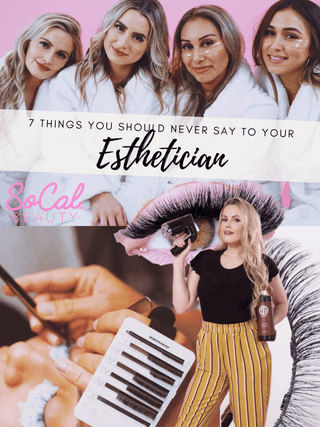7 Things You Should Never Say To Your Esthetician
Visiting an esthetician can work wonders for your skin, but have you thought about how what you say during your appointments could be impacting the results you get - not to mention driving the skincare therapist mad? There are some things that constantly crop up in esthetics appointments that highlight some basic misunderstandings when it comes to skincare and can impede the building of an honest and productive relationship with your skincare professional. Let’s take a look at those phrases and sentiments to avoid.
1. I have sensitive skin
On the face of it, there is nothing wrong with telling your esthetician that you have sensitive skin. It is the sort of information that they need to have. The problem rests in the vagueness of the statement. Your skincare therapist needs to know much more than this broad statement supplies, such as whether you have any specific allergies and whether you suffer from breakouts or are prone to redness in certain areas. Your esthetician will want to know details, including any past reactions.
2. I don’t know all of the different products I use on my skin

Your esthetician will want to know what you put on your skin in order to determine where any problems may be coming from. Before your esthetics appointment, try to make a list of the different products you use or the active ingredients, and remember: the more honest you are and the more information you provide, the easier it will be for your therapist to help you improve your skin's health and appearance.
3. My dermatologist has prescribed "something" for me to use
Once again, it is the vagueness of this statement that can cause problems. Your esthetician will need to know exactly what you have been prescribed in order to offer a complementary service that will not overstimulate your skin. This is vital if you are using products with particularly aggressive ingredients, which are common in many products that dermatologists may prescribe.
4. I have just had injectables
This is almost a surefire way of ending your esthetics appointment early or, at least, limiting what can be done. If you have just had Juvéderm, Botox, Restylane or another injectable, you shouldn’t have your skin manipulated. These sorts of injectable treatments have waiting periods that any good esthetics specialist will adhere to in order to avoid ruining the effects of hundreds of dollars worth of other treatments. In an ideal world, you need to schedule your esthetics appointment before seeing your plastic surgeon. If you can’t do this, you will usually have to wait between 7 and 10 days before any massages, extractions, or other treatments involving the manipulation of your skin.
5. My products are all really good

You may be using what you believe to be the best products around, but this does not mean that they are necessarily the best products for you. There is no point in just telling your esthetician that you use good products without giving them the specifics. For starters, they will have no idea how you classify products as being good. Is it because they are the most expensive, have the most sway with social influencers, or just smell really nice? Your esthetician will want specifics, such as what products and brands you use, in order to offer you the most appropriate advice for your needs. So, whether you use the Keep It Squeaky Rose Water Lash Cleanser, the Boi Bye Makeup Removing Pen, or a multitude of different products, make a list and take it with you to your appointment.

6. I don’t need…
Estheticians are often left feeling frustrated by clients who go to appointments and start out by telling them that they don’t need extractions or other treatments. You are spending lots of your hard-earned money on seeing your esthetician, so you should be aiming to get the most out of this investment. That means keeping an open mind when you go to appointments and being willing to take professional advice. Of course, that doesn’t mean you have to do anything you don’t feel comfortable with.
7. I’m allergic to…
Your esthetician needs to know about any allergies, but springing relevant ones on them during your session may not be the best approach. It can mean you end up paying for an appointment that is almost wholly taken up by your therapist looking up ingredients. Instead, it can really pay to let your esthetician know about any allergies well in advance of your appointment.

